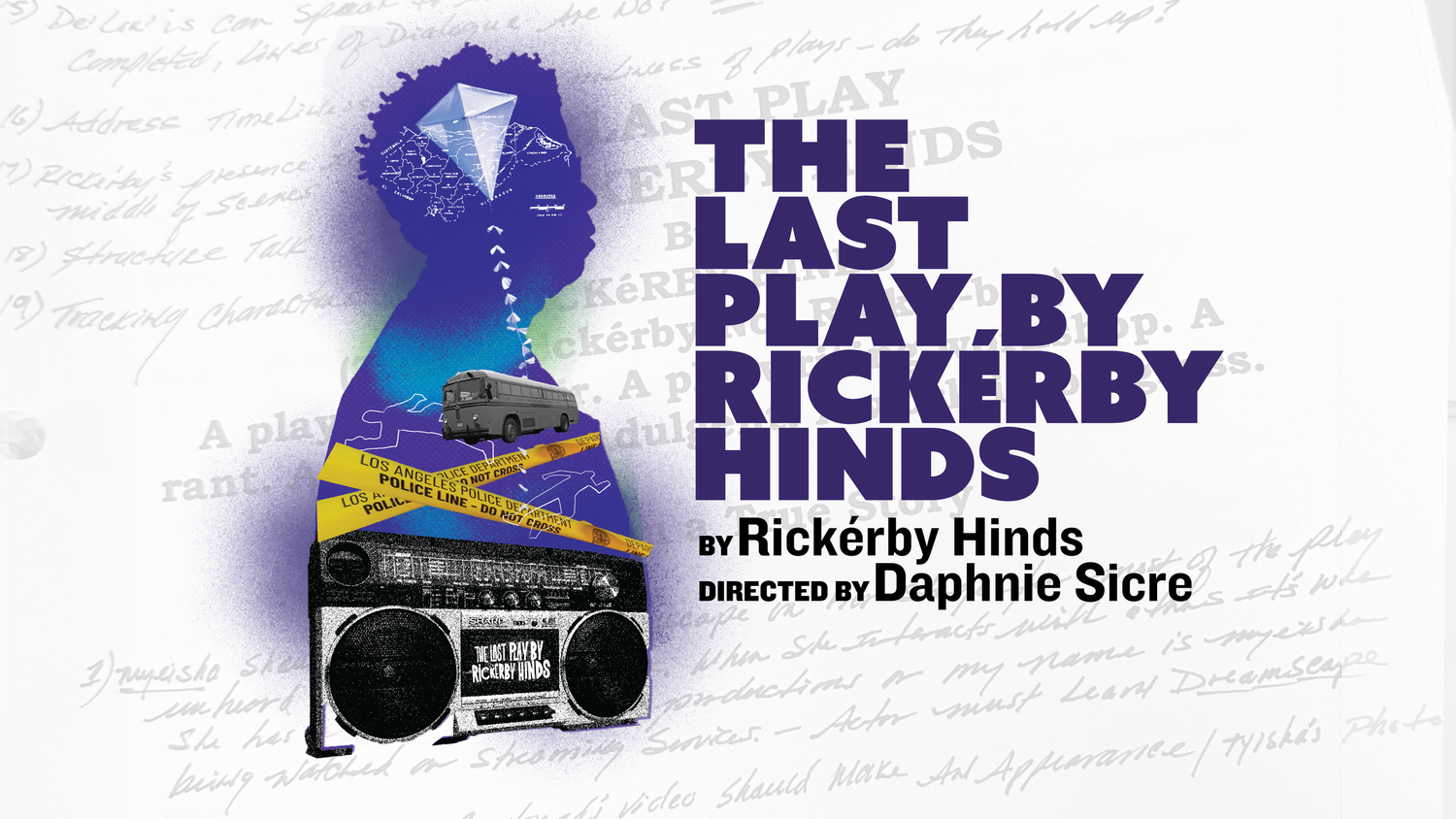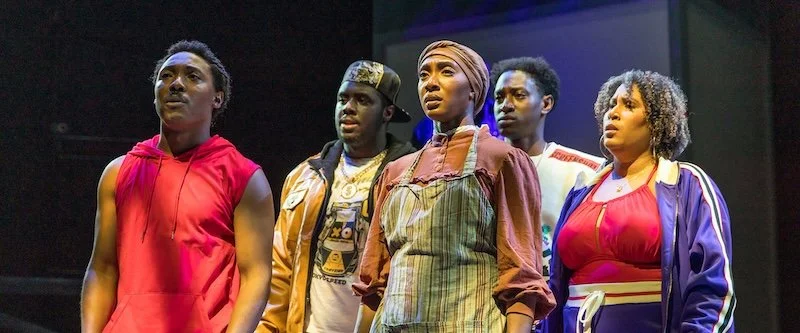The Last Play By Rickérby Hinds:A bullseye for Afrolatino theatre... from the Understudy's perspective
By: Shannon J. Sharpe
The Last Play by Rickérby Hinds takes aim at the exact intersection of African American and Latinos/Latinas/Latin-equis/Latinése identities, hitting a perfect bullseye for Afrolatino Theatre.
The last play surrounds the character of the actual Playwright, Rickerby Hinds, as he sets off to write his last play with the help of characters from his previous play.
I was cast as the female understudy. My task was to examine three roles and be ready to perform them at a moment's notice. Though the experience became so much more than that as I gained an insurmountable amount of knowledge, confidence, and friendship through the process. In addition to a shared duty with my castmates to deliver this important story to the public.
As most readers of this blog know, there is a multitude of Latino people who will not pass the brown paper bag test (The brown paper bag test was an American cultural test of people's complexion versus a brown paper bag. Often, if you were darker than a brown paper bag, you were not allowed into parties, certain establishments, schools, or careers.) but are rarely shown in the media or made the central character of a narrative. This play brilliantly tackles that invisibility.
The playwright, Rickérby Hinds, as well as our lead actor, Khalif Gillett, both at first glance could be categorized as African American; however, both descend from proud Latino heritages. That in no way takes away from their blackness; it is an enhancement.
Khalif J. Gillett / Grettel Cortes
Khalif J. Gillett - Rickérby Hinds
Being from LA, and getting to—for the first time—do theatre professionally in LA was a monumental moment for me. This was the first time some of my family has actually gotten to see me perform. This was also my first professional leading role, which was, in itself a special moment. - It was incredibly validating to my identity and my experience to get to be seen fully as both Black and Latino onstage. It was an immense honor, I haven’t even fully processed, but I felt like I didn’t have to fight for my place in the community for once.
- Khalif J. Gillett and I am Belizean.
The playwright Rickérby Hinds hails from "the depths, Las Honduras. Where a trivial life and anonymous death are not -new-to-us." In The Last Play, Rickérby Hinds lovingly presents the beautiful island of Honduras through a scene from his unfinished play Duppy Child: “When covid causes Lori’s Jamaican cruise ship to be diverted to the Bay Islands of Honduras, the locals believe that this 40 year old Black woman from Californian is the Chosen One they’ve been waiting for and set out to prove it to her by taking her on a tour of her island home... although she has never been there.” Hinds shares haunting memories from the island of flying kites with his father and hurricane Fifi that claimed the lives of over 8000 souls in his youth.
Mr. Hinds is a wonderful professor and playwright, so in the process of the show, the audience receives a healthy dose of Honduran facts, somehow still leaving us hungry for more. One fun fact I'll share with you before you see the show: “Honduras is a 'Banana Republic." For those of you envisioning the "Global lifestyle brand of over-priced casual clothes," stop it! A banana republic is a country whose economy is entirely dependent on a single product, typically controlled by foreign companies—Standard Fruit Company, United Fruit Company, Chiquita Banana in Honduras.”
Our lead actor, Khalif Gillett, who plays Rickérby Hinds, and his family hail from the beautiful island of Belize. His charismatic aunt, who resides in Crenshaw, attended and marveled at her nephew speaking and singing in Spanish. It meant so much to her for her nephew to be representing their heritage on stage for all of Los Angeles to see.
The Last Play by Rickerby Hinds holds a mirror up to both Black and Latino communities and screams, "We are all the same!" Our cast was taught by our brilliant professor Daphnie Sicre, working as our dramaturge and director, that with the vast reach of the colonial slave trade, countless Africans were sent into South America and now account for large portions of the Latino population. Most of the time, we look the same, as we are nothing but a boat stop away from being Honduran, Belizean, Trinidadian, Costa Rican, or straight from Mississippi.
As a cast from all around the country, rehearsals sparked amazing conversations about AfroLatinos all over America. I grew up surrounded by AfroLatinos on the East Coast. Brentwood, NY, is a predominantly Latino community where people were very proud to show they were part of the majority, though at first glance, people thought they were simply of African descent.
Fitting in is a fundamental survival technique, as my own father can attest. He lived in Trinidad until he was 10 and moved to Brooklyn, NY. He always told me that to fit in with the other kids, the only thing he had to do was get rid of his accent. And he did. Very quickly. Many Caribbean people emigrate to the East Coast, often settling in New York due to economic and proximal reasons. Rickérby’s family moved from Honduras to the West Coast, but through his play Birthmark, I still see my father's East Coast immigrant story highlighted within The Last Play.
One of the most striking scenes features three young men on a bus ride to school: two are friends who love hip-hop, and the other, an immigrant boy with a heavy accent and no knowledge of "Rapper's Delight.” At first glance, Kique is one of them. But when his accent, foreign origin, and lack of hip hop knowledge is revealed, he is cast out in the worst way. Kique was played by Rogelio Douglas III, who hails from Costa Rica by way of Brooklyn, NY. Rogelio fully embodied his characters using his own Afro-Latino experiences to enrich every character he graced the stage with.
Shared experiences continued to emerge as the cast grew closer together as we delved deeper into these characters.
Celia Mandela Rivera portrayed the role of Deloris, the protagonist of Rickérby’s unfinished play Duppy Child - Celia is of Puerto Rican and Panamanian descent. Through the rehearsal process, we discovered our grandmothers both came to America and worked as maids on Long Island to gain their citizenship. With such a strong Caribbean network, we wondered if they had crossed paths as young, ambitious women making their way in a new country. We wonder what they sacrificed, and what courage they must have had to work and bring themselves and their children to the U.S. This shared history of migration and resilience is a powerful underlying current in the play.
Celia Mandela Rivera -- Doloris/Andromeda
Performing in the LPBRH made me feel proud and seen -- like our rich cultures and stories and intersectionalities matter. Afro-Latinidad can often feel isolating on the West Coast, so it was beautiful to connect with people in the audience who either personally lived those experiences or maybe some weren't part of the culture but were just excited to be along for the ride.
Celia Mandela Rivera -- Panamanian & Puerto Rican
When I moved to Los Angeles, the lack of people who might 'fail the brown paper bag test' became starkly apparent, to the point that I get slightly giddy when three or more of us gather in one room. Though the Mexican community rightfully dominates the West Coast, African Americans and Mexico have a long history of solidarity. The joking notion of a “Blaxican!" is introduced in The Last Play by Rickérby Hinds. Though playful, it is probably a very accurate description of an overlooked community. With the lesser-noted underground railroad to Mexico that welcomed runaway slaves as free people, a "Blaxican" is probably more common than you think. Mexico refused to return any human beings to slavery, allowing them to live free as soon as they crossed the border. This shared history should embolden these communities to continue coming together as they always have. This shared history is exactly why Los Angeles and The LATC was the perfect setting for the premiere of The Last Play by Rickérby Hinds.
The Last Play also features Black Characters like Harriet Tubman from Straight From Tha Underground played by Breayre Tender, and Down, an African American Quarterback who never got the shot he deserved from the Play Blackballin’ played by Darius Marquis Johnson. As well as Ra, a rap god from Hinds play Keep Hedz Ringin’, played by Lee Harris.
Through this process, a fire was lit in each actor and then ignited in the audience. People came back 6, 7, 8, 9 times to see this specific show, which touched upon stories we never see on stage or screen. People finally saw themselves, their cousins, uncles, aunts, brothers, and sisters on stage. They heard their songs as the cast burst into an impressive rendition of "El Ray" and saw their stories unfold when Kique just didn't fit in.
Khalif J. Gillett
I’ve performed a few smaller projects that required me to speak Spanish, and I’ve played Usnavi in In The Heights, but none of those required this level of Spanish literacy to pull off. And then singing a song in a language I don’t speak and in a style that is in some ways equivalent to Classical music was insane! It’s one of those moments that you either let the imposter syndrome get to you or you rise to the occasion—and I like to think I rose to the occasion. This was honestly something I didn’t know I could do until I was faced with the challenge.
Khalif J. Gillett and I am Belizean.
Celia Mandela Rivera
Being able to sing in Spanish felt like a reclamation. I don't speak it fluently, but that doesn't mean that when I speak it or hear it or sing it, that I don't feel it deep within my soul. I also got to rap in Spanish, and Panama is considered to be where reggaeton started, and Puerto Rico really expanded it into a global music movement, and that's my exact heritage: Panamanian and Puerto Rican -- so It felt like a true homecoming. An homage to mi gente.
Celia Mandela Rivera -- Panamanian & Puerto Rican
The Last Play is not just a performance; it’s a vital conversation, a "memoir, a playwriting workshop, a rant, a work in progress" that challenges perceptions and celebrates the multifaceted tapestry of Black and Latine identities. As the female understudy, I witnessed firsthand how this play resonates deeply, fostering understanding and pride within our communities. The Last Play by Rickérby Hinds is coming to a theatre near you. Keep an eye out for this beautiful production, and you will laugh, cry, dance, learn, and celebrate an AfroLatino experience.
Shannon J. Sharpe
Shannon J. O’Connor-Sharpe is a writer, actor, and filmmaker based in Los Angeles, California, dedicated to amplifying the voices of diverse communities. As a voiceover artist, she has narrated the audiobook "When Banana Stains Fade" by Frances-Marie Coke and lent her voice to a character in the Slamdance award-winning animated short "Super High." Shannon recently wrote and starred in her first short film entitled "Wiggin’ Out!!!" Originally from Long Island, NY. Shannon holds an M.A. in Television, Radio, and Film from Syracuse University. Shannon is a proud member of the Actors' Equity Association and SAG-AFTRA. Follow Shannon J. Sharpe on all platforms @ShannonJSharpe.




